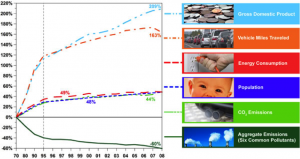 Environmentalists critical of electrified America must have mixed emotions this time of the year. It may be the season of good cheer and goodwill toward all, but it is also the time of the most conspicuous of energy consumption. America the Beautiful is at her best in December when billions of stringed light bulbs on buildings and trees turn the mundane or darkness itself into magnificent beauty and celebration.
Environmentalists critical of electrified America must have mixed emotions this time of the year. It may be the season of good cheer and goodwill toward all, but it is also the time of the most conspicuous of energy consumption. America the Beautiful is at her best in December when billions of stringed light bulbs on buildings and trees turn the mundane or darkness itself into magnificent beauty and celebration.
Holiday lighting is a great social offering—a positive externality in the jargon of economics—given by many to all.
In terms of proved reserves, world oil reserves are 20 times[i] greater now than they were when record-keeping began in the 1940s; world gas reserves are over six times[ii] greater than they were in the 1960s; world coal reserves have risen almost fourfold[iii] since 1950. Political events can drive supply down and prices up, but the raw mineral resource base is prolific—and expanding in economic terms thanks to an inexhaustible supply of human ingenuity and exploratory capital.

Record energy consumption has been accompanied by improving air quality. The U.S. Environmental Protection Agency reported that urban air quality is almost 60 percent better today than in 1970 in the United States.[iv] According to the Energy Information Administration, this fall in criteria pollutants was accomplished when fossil energy usage increased by almost a third.[v] Further air emission reductions are expected, but it will not be accomplished by forcing higher prices or inconvenience levied on consumers. It will be accomplished with market incentives, technological improvement, and regulation based on sound science, not alarmism.
But most importantly, the wealth created from affordable, plentiful energy provides the primary means for societies to improve the environment. In the final analysis, wealth is environmental health, which explains why increasing energy usage and environmental improvement have gone hand in hand in the Western world.
There is much to be thankful for this holiday season with our energy economy. But thoughts about the less fortunate should be with us too. An estimated 1.4 billion people do not have electricity for lighting, heating, cooling, cooking, or water purification. For these people, there could be no greater holiday gift than affordable electricity itself, explaining why the developing world has flatly rejected proposals from environmental elites to forsake future energy usage.
Energy consumption is good—for comfort, convenience, and even celebration. May one and all in good conscience enliven this holiday season with lights aplenty. With energy technologies rapidly improving, Americans can look forward to even more energetic celebrations and shared goodwill in the holidays ahead.
Christmas lights photo courtesy of Flickr user Andy Peters
[i]Robert Bradley, Julian Simon and the Triumph of Energy Sustainability (Washington: American Legislative Exchange Council, 2000), pp. 29–30, and Energy Information Administration, http://tonto.eia.doe.gov/cfapps/ipdbproject/IEDIndex3.cfm?tid=5&pid=57&aid=6
[ii]Robert Bradley, Julian Simon and the Triumph of Energy Sustainability (Washington: American Legislative Exchange Council, 2000), pp. 29–30, and Energy Information Administration, http://tonto.eia.doe.gov/cfapps/ipdbproject/IEDIndex3.cfm?tid=3&pid=3&aid=6
[iii] Robert Bradley, Julian Simon and the Triumph of Energy Sustainability (Washington: American Legislative Exchange Council, 2000), pp. 29–30, and Energy Information Administration, http://www.eia.gov/aer/pdf/pages/sec11_27.pdf
[iv] Environmental Protection Agency, http://www.epa.gov/airtrends/2006/emissions_summary_2005.html and http://www.epa.gov/airtrends/aqtrends.html.
[v] Energy Information Administration, Annual Energy Review, http://www.eia.gov/aer/pdf/pages/sec1_9.pdf



